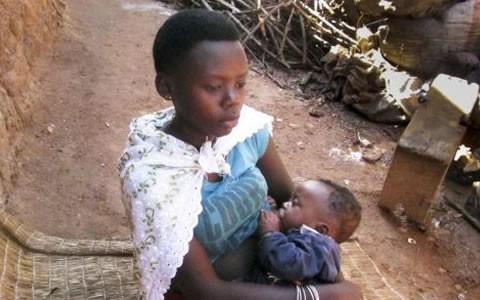Liberia: Teenage Pregnancy Skyrockets in Rivercess County

A teenage baby mama in Liberia.
Rivercess County now accounts for 55 percent, more than half of the recorded teenage pregnancies in the whole of Liberia, according to the Liberia Demography and Health Survey of 2019.
Because of this high percentage, the Liberian Government through the Ministry of Health and UN Population Fund (UNFPA) over the weekend launched an intervention under the theme: “Empowering Adolescents to Prevent Unplanned Pregnancy within the Context of Covid-19 Recovery in Rivercess County.”
The Health Ministry and UNFPA, with support from Irish Aid, decided to use a three-access point approach: community, school and health facilities to reach their targeted beneficiaries.
“The program implementation strategy used to increase young people’s access to services in Liberia’s five hardest to reach counties — Grand Gedeh, River Gee, Maryland, Grand Kru, and Sinoe — uses three access points — community, school, and health facilities to reach them with information and holistic package of services including family planning, antenatal and delivery care including Emergency Obstetric and Neonatal Care services, sexuality education in both schools and community settings as well as the engagement of the County and Community leadership for oversights and coordination. The use of the model led to the decline in teenage pregnancy by 44 percent and improvement in many maternal health indicators in River Gee, Grand Gedeh, Maryland, and Grand Kru Counties, as evidenced by the result of the 2020 Liberia Demography and Health Survey (LDHS),” the UNFPA said.
It's not yet known why the government and its partners took this long to begin making an intervention as the data from the LDHS had been out since 2019. Rivercess's status as one of the poorest counties in Liberia means an alarming teenage pregnancy rate. It’s estimated that on average 3 in 10 Liberian girls are pregnant before the age of 18. The rate of pregnancy among adolescent girls aged 15-19 in rural areas is almost double that in urban areas – 42% and 24% respectively. Many teenage mothers are between 12-14 years old and are at risk for numerous complications associated with pregnancy.
Notwithstanding, the US$1.2 million financial support from the Irish Government, from which teens and adolescents in Rivercess are now benefiting, their counterparts in Liberia’s five hard-to-reach Southeast counties, began benefiting a few years ago.
This Irish-support project is expected to last until 2023. But speaking on behalf of the United Nations’ specialized agency, UNFPA, Dr. Philderald Pratt, Assistant Representative, pledged UNFPA’s commitment to deliver a Liberia where every pregnancy is wanted, every birth is safe and every young person’s potential is fulfilled.
Earlier, he informed the audience, including students, youths, traditional birth attendants, government officials, etc, that the UN Sexual and Reproductive Health Agency’s 5th program for Liberia (2020 to 2024) “is fully aligned to address maternal and other challenges in support of the Government of Liberia’s Pro-Poor Agenda for Prosperity and Development (PAPD) 2018 to 2023 through the United Nations Sustainable Development Assistance Framework.”
“The aim of the 5th UNFPA County Program is to increase universal access to and utilization of Sexual Reproductive Health and Rights information and services by women, adolescents and youth focusing on the hard-to-reach counties of Liberia,” Dr. Pratt added.
Also, the Embassy of Ireland said the project in Rivercess is geared towards empowering adolescents to prevent unplanned pregnancy. “We know that about 65 percent of maternal deaths are among girls and young women aged between 15 to 24 years. We know that infant mortality is at 63 deaths per 1000 live births, and we know that infants born to adolescents face greater risk of dying. Here in Rivercess in particular, we know that there is the highest rate of teenage pregnancy in the country and that this is accompanied by the highest rates of stunning in the country,” Kate O’Donnel, Chargé d’Affaires, Embassy of Ireland, said. She further said they had decided to support the program, knowing that urgent action is needed to stimulate positive change.
Also, Cestos High School 11th grader, Diana Nyanquoi, who spoke on behalf of all the students, urged her fellow females not to fall for teenage pregnancy. Ms. Nyanquoi pleaded with them to stay in school until they finish before thinking of having children.
Before he did the formal launch, Dr. Gorbee Logan, Assistant Minister for Curative Services at the Ministry of Health, said in 2021, considering the results that they were receiving, the government requested UNPA to bring to Rivercess the Sexual and Reproductive Health Project as is the same in other counties.
“So, today we are here to bring this same program to help the people of Rivercess. One of the most important things we want our young people in Rivercess to understand is that it is not a bad thing for a woman to get pregnant. But for the young girls, all we are saying is delay the pregnancy until you have gone to school and finished,” Dr. (MD) Logan said.
He also urged the young and older men, too, especially those who are still in school, to join the girls and delay child bearing for now. He told them that it will be wise to continue their schooling until they are out of college before thinking of having children, at which time, they will be financially capable to support their children and maybe able to lend helping hands to other family members.
He urged the young girls and women to get on Family Planning so that they can have delayed pregnancies, "this program is also going to teach you about how to prevent yourselves from sexually transmitted infections (STDs), including HIV,” Dr. Logan added.
After saying a few words in the Bassa vernacular to the people, he then formally launched the Rivercess project.

